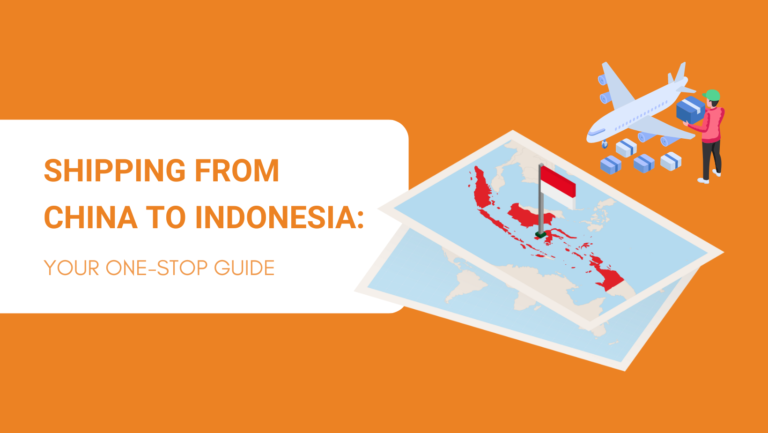Navigating the process of shipping from China to Indonesia can be a significant part of your business’s success, especially considering the robust trade relationship between the two countries.
With a multitude of shipping options at your disposal, it’s essential to understand the differences between sea, air, and express shipping to make the best choice for your needs.
Selecting the right freight forwarder is just as important. With the right partner and knowledge, you can efficiently employ key strategies for importing goods to Indonesia.
Your enterprise’s proficiency in these areas can mean the difference between merely surviving and truly thriving in the Southeast Asian market.
And this guide is here to help demystify the process, offering you a solid understanding of shipping routes, costs, transit times, and the intricacies of customs compliance.
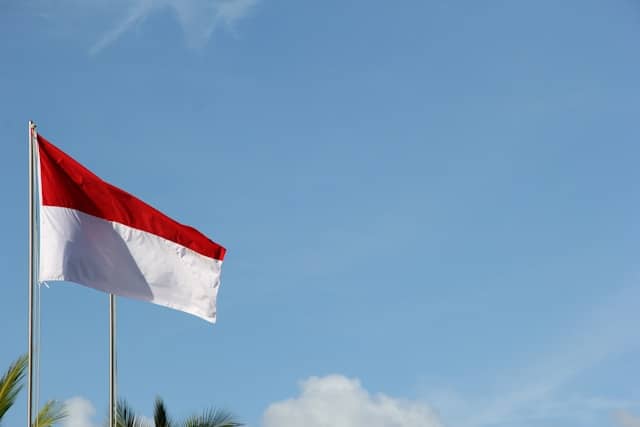
Modes of Shipping: Sea, Air, and Express Shipping
When shipping from China to Indonesia, you have several options tailored to the weight, size, and urgency of your cargo. Sea freight is ideal for heavy or bulk items, air freight suits urgent shipments, and express shipping guarantees speed for critical deliveries.
Sea Freight
Sea freight is the most common method for shipping substantial volumes of goods from China to Indonesia due to its cost-effectiveness for large shipments.
Utilizing container shipping, goods are often transported in 20 or 40-foot containers, and you can choose between Full Container Load (FCL) and Less than Container Load (LCL).
FCL is more suitable if you have enough goods to fill a container, providing you with a container exclusively for your cargo.
On the other hand, LCL allows you to share container space with other shippers, which can be a more economical option if you’re not sending large quantities.
Key operations begin at major Chinese ports, such as the Port of Shenzhen, which plays a significant role in the sea freight forwarder business.
While sea freight forwarders help manage the logistics and documentation, you should also consider the slower freight transit times compared to other shipping options, as well as potential delays caused by weather or port congestion.
Pros
- Cost-effective for large shipments
- Substantial volume capacity
Cons
- Longer transit times
- Prone to delays due to weather or other factors
Top-Rated China Freight Forwarder
Expert Shipping Solutions for Your Needs
Air Freight
If time is of the essence, air freight is your best bet. It is significantly faster than sea transport and is often used for high-value or perishable items that need to be delivered quickly.
While air freight cost is higher than sea freight, the air freight transit time can be as short as a few days, making it ideal for urgent shipments.
When considering air freight, think of goods like electronic components or fashion items, which might have a high turnover and require quick restocking.
Insurance options like cargo insurance are also critical when choosing air freight due to the higher value of goods typically transported by this method.
Pros
- Fastest method for international shipments
- Ideal for high-value or perishable goods
Cons
- More expensive than other shipping methods
- Limited by cargo size and weight
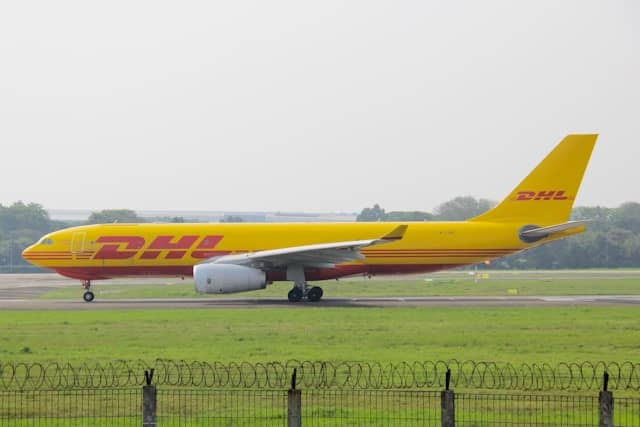
Express Shipping
For most time-sensitive deliveries, express shipping is the simplest option and often operates as door-to-door shipping. It utilizes a network of express courier services that ensure your cargo reaches its destination swiftly.
Delivery times can range from overnight to a few days, making express shipping ideal for urgent documents, samples, or high-priority items.
Express shipping is the go-to choice for shipments that are too urgent to wait for regular air freight timelines or when a very precise delivery date is required. It is worth noting that while express shipping is the priciest option, its speed and convenience are unmatched.
Pros
- Extremely fast delivery times
- Convenient door-to-door service
Cons
- Highest cost among shipping options
- Usually limited to smaller packages
Each shipping mode has unique benefits tailored to different needs. Your choice will depend on factors like the type of goods you’re transporting, budget, and how quickly you need them to arrive in Indonesia.
Key Ports in China and Indonesia for Shipping
When you’re shipping from China to Indonesia, knowing the key ports involved is crucial for planning your logistics. Here’s a simplified guide to the major ports that will likely play a role in your shipments:
China
- Shanghai: The Port of Shanghai is not only the busiest port in China but also in the world. With state-of-the-art facilities, it can handle a massive volume of cargo. This port is your go-to for efficiency and connectivity.
- Hong Kong: While this bustling metropolis is famous for its skyline, Hong Kong’s Port is a global shipping hub with modern facilities, providing excellent access to international markets.
- Guangzhou: The Port of Guangzhou is a comprehensive deep-water port with a wealth of experience in handling varied types of cargo.
- Port of Shenzhen: Closest to Southeast Asia, this port has specialized warehousing and is vital for mid-mile shipping steps, making it a strategic point for shipping to Indonesia.
Indonesia
- Jakarta: The Port of Tanjung Priok in Jakarta is the busiest and most advanced Indonesian port, serving as the main gateway for international trade.
- Surabaya: For shipments heading to eastern Indonesia, the Port of Surabaya is well-equipped to handle various cargo efficiently.
Shipping Costs from China to Indonesia
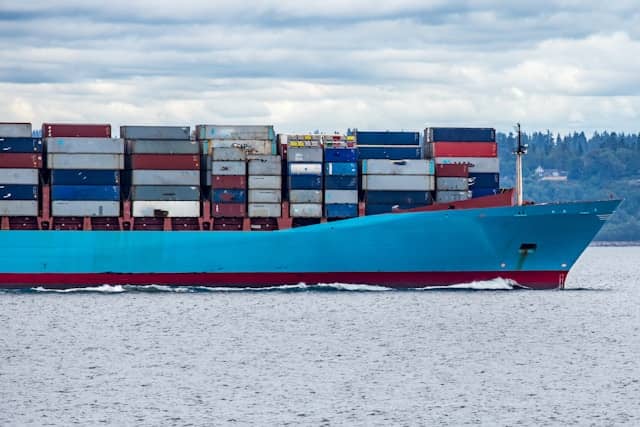
When considering shipping from China to Indonesia, it’s crucial to have an understanding of the various factors that affect costs, as well as what price ranges you can expect for different shipping methods.
Factors Influencing Shipping Costs
Several elements play a role in determining the shipping cost. The size and weight of your cargo matter significantly; larger and heavier shipments typically cost more to transport.
The type of goods being shipped can also influence the cost, especially if they require special handling or are considered hazardous.
Additionally, shipping rates are affected by the chosen Incoterms, with options like CIF (Cost, Insurance, and Freight) including more services and therefore, impacting the price.
The mode of transport, whether air freight or sea freight, also makes a difference, with sea generally being the more cost-effective shipping method but slower than air freight.
Consolidation services can be the cheapest way to ship as they allow for sharing container space with other shipments.
Keep in mind, external factors like fuel surcharge, VAT, import tax, and seasonal demand can also affect the freight shipping cost.
During peak seasons, prices may increase due to higher demand. Understanding these factors can help you navigate the complexity of international shipping and manage your shipping budget effectively.
Pricing Estimates
When assessing pricing estimates, it’s essential to recognize that they can vary widely. Below is a table summarizing estimated costs for different methods of shipping:
| Shipping Method | Estimated Cost Range |
| Sea Freight (LCL) | $30 – $60 per CBM |
| Sea Freight (FCL) | $1,500 – $2,500* |
| Air Freight | $2 – $4 per kg |
| Express Shipping | $5 – $8 per kg |
*based on a 20-ft container
Remember that these estimates may not include additional fees such as customs clearance, documentation fees, or DFH Global Logistics handling charges.
Air freight tends to be more expensive than sea freight, but is faster and may be more suitable for smaller, time-sensitive shipments.
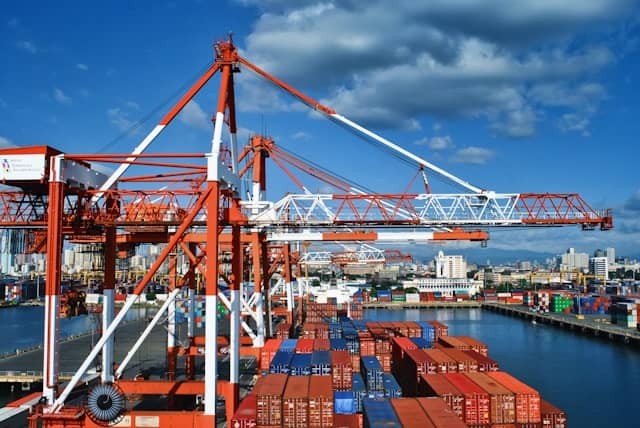
Transit Times from China to Indonesia
Navigating the shipping routes from China to Indonesia involves grasping the various transit times associated with different modes of transport.
Air Freight: On average, air freight transit time from China to Indonesia can range from 3 to 5 days. However, the efficiency of air shipping often comes with a higher cost.
Sea Freight: Sea shipping offers a more cost-effective solution but takes longer, with transit times typically between 14 to 25 days depending on the specific sea route and vessel speed.
Express Shipping: Top express couriers like FedEx, UPS, and DHL offer speedy delivery options which can drastically reduce shipping time to 3-5 days.
Factors Influencing Transit Schedules
Your actual shipping time could be impacted by several factors, including:
- Customs clearance processes: Delays can occur when paperwork is incomplete or incorrect.
- Route efficiency: Direct shipping routes are faster than those requiring transshipment.
- Port congestion: Busy ports can slow down cargo handling.
- Weather conditions: Adverse weather may lead to unexpected delays.
- Logistics operations: Good coordination among your logistic partners can streamline transit schedules.
Tips for Smooth Shipping
- Always have your documentation ready and correctly filled out to avoid customs delays.
- Choose routes with fewer stops if time is a critical factor for your cargo.
- Stay informed about weather patterns that may affect your shipping times.
- Work with reliable logistic companies that maintain good operational standards.
Transit Times Summary Table
| Shipping Method | Average Transit Time | Notes |
| Air Freight | 3-5 days | Fastest option but also the most expensive. |
| Sea Freight | 14-25 days | More affordable but slower, ideal for larger shipments. |
| Express Shipping | 3-5 days | Comparable to air freight but with courier services handling. |
Remember, these transit times are averages, and actual time may vary. For real-time transit updates and a more accurate estimate tailored to your shipments, consult with freight forwarders who specialize in the China-Indonesia trade lane.
Understanding Customs Clearance and Compliance
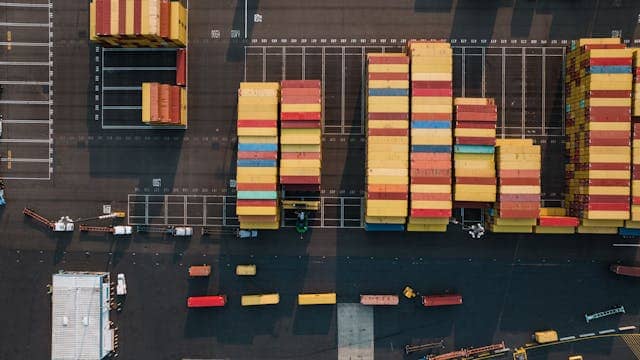
When you’re shipping from China to Indonesia, dealing with customs clearance is crucial.
A thorough understanding of customs duties, regulations, and compliance can save you from unexpected costs and delays.
Customs duties are taxes imposed on imported goods. The amount often depends on the category of goods as determined by its Harmonized System (HS) code. Duties can vary widely, but they exist to protect local industries and generate revenue.
To navigate the customs process smoothly, you should know the proper shipping documents. These are essential for compliance with customs regulations and tax liability calculations.
Here’s a concise guide to the key documents you’ll need:
- Commercial Invoice: This document details the transaction between seller and buyer and is pivotal for customs valuation.
- Packing List: This outlines everything that is being shipped, which customs officials use for verification.
- Certificate of Origin: Verifies the country where the goods were manufactured, which can affect the duties imposed.
- Bill of Lading/Air Waybill: Acts as a receipt of freight services, a contract between a shipper and carrier, and a document of title.
- Import License: Required for certain goods, verifying your permission to import.
- Customs Declaration Form: Declares the value, quantity, and nature of imported goods.
If you’re so confused about these various documents, consulting with a customs broker can be helpful.
They are professionals who specialize in the entry procedures, admissibility requirements, classification, valuation, and the rates of duty and applicable taxes and fees for imported merchandise.
In addition, to avoid problems with customs, ensure that your labeling is accurate and in compliance with Indonesian requirements. Check that HS codes are correctly classified, as misclassification can lead to significant fines or delays.
So, by showing diligence with your documentation and compliance, you’ll be more likely to have a smooth experience when importing into Indonesia.
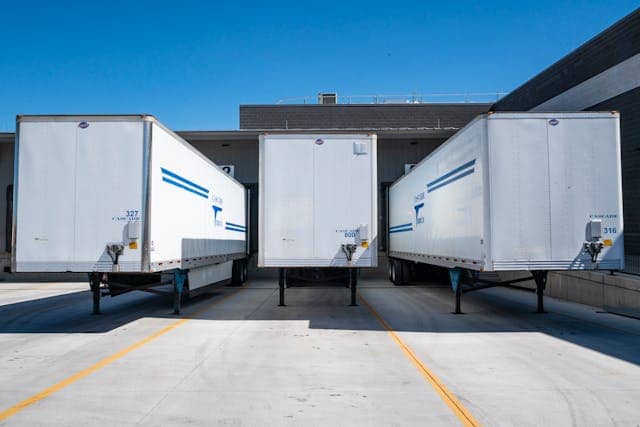
How to Choose the Right Freight Forwarder
1. Identify Your Requirements.
Before you start, figure out your shipping needs from China to Indonesia.
Do you need door-to-door delivery, or are port-to-port services sufficient? Are your products oversized or require special handling? Clarify these details as they will determine the kind of freight forwarder you’ll need.
2. Research Their Expertise.
Look for a freight forwarder with a proven track record in navigating the China-Indonesia shipping route. Their experience with local suppliers, manufacturers, and logistics networks is crucial.
3. Assess Their Network.
Your freight forwarder should have established relationships with China suppliers and manufacturers to facilitate smooth coordination and timely pick-up of cargo.
4. Check Reliability and Customer Service.
Reliable freight forwarders ensure timely communication and updates about your shipments. They should offer solutions promptly if issues arise, such as customs delays or warehousing problems.
5. Verify Their Compliance Knowledge.
Ensure they are well-versed in both countries’ regulatory requirements to prevent legal issues that might affect your cargo.
6. Evaluate Their Additional Services.
Some forwarders may offer value-added services like helping you sell on Alibaba or Amazon FBA and may have partnerships with companies like DFH Global Logistics that can benefit your business.
7. Compare Prices and Service Quality.
Don’t choose based on price alone. Higher cost might mean better service quality and fewer headaches down the line. Consider all factors to make an informed decision.
Top-Rated China Freight Forwarder
Expert Shipping Solutions for Your Needs
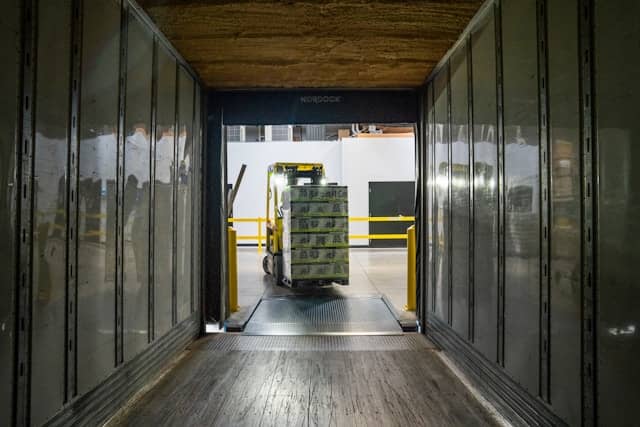
FAQs about Shipping from China to Indonesia
This section answers some of the most common inquiries concerning the process of shipping goods from China to Indonesia.
How Much Does Import Duty Cost in Indonesia?
In Indonesia, all taxable goods imported have an import duty of 7.5% and a 10% value-added tax. This means importers must pay a total of 17.5% for taxable items imported into Indonesia.
What Are Some Prohibited or Restricted Items to Ship to Indonesia?
Indonesia regulates the import of certain goods based on the Restricted and Banned Goods List, or the “LARTAS list.”
This includes prohibited items like finished hand tools, sugar, ozone-depleting substances, certain drugs and foods, and hazardous and toxic materials.
Export prohibitions from Indonesia include scrap metal, cultural heritage goods, subsidized fertilizers, mining products, forestry, and certain agricultural products.
How Can I Reduce Shipping Costs from China to Indonesia?
- Consolidate Shipments: Combine multiple small shipments into larger ones to take advantage of economies of scale and negotiate better rates with freight forwarders .
- Optimize Packaging: Use lightweight yet durable materials and optimize package dimensions to maximize shipping space and minimize costs.
- Choose the Right Shipping Method: Compare air freight (faster but more expensive) and ocean freight (lower cost but longer delivery times) to find the most cost-effective option.
- Negotiate with Freight Forwarders: Build strong relationships with freight forwarders to negotiate better rates based on your shipping volume and frequency.
Can I Track My Shipment from China to Indonesia?
Yes, you can track shipments from China to Indonesia. Parcel Monitor offers tracking for all shipments from China, providing updates on the transit status via email.
This service is available for any courier and in multiple languages, allowing you to track packages quickly and conveniently.
Wrapping Up: Key Strategies for Shipping from China to Indonesia
Shipping from China to Indonesia requires careful consideration and strategic planning to ensure your goods arrive safely and cost-effectively.
Key strategies include understanding regulatory requirements, choosing the right mode of transportation, and working with a reliable logistics partner.
- Get Informed: Stay up-to-date with trade laws in both countries to avoid unexpected delays or expenses. Regulations can change, so continuous research is crucial.
- Choose Wisely: For large volumes, ocean freight is generally more cost-effective, while air freight is faster for smaller shipments. The cost of shipping a 40 ft container may vary, so always compare prices.
- Plan Ahead: Consider factors like the ports of arrival and destination, as well as peak season to ensure timely delivery.
- Collaborate: Partner with experienced logistics providers to navigate the complexities of international shipping. These experts can help with documentation, customs clearance, and ensure competitive rates.
Finally, remember that partnering with a sourcing expert can significantly streamline your shipping process. If you need assistance to procure products from China to Indonesia, feel free to request a sourcing quote.
For a comprehensive solution, we also offer freight forwarding services. Request a freight forwarding quote to ensure your goods are transported efficiently and cost-effectively from origin to destination.
Our team at Niche is here to support your shipment needs with specialized knowledge and dedication to service.
